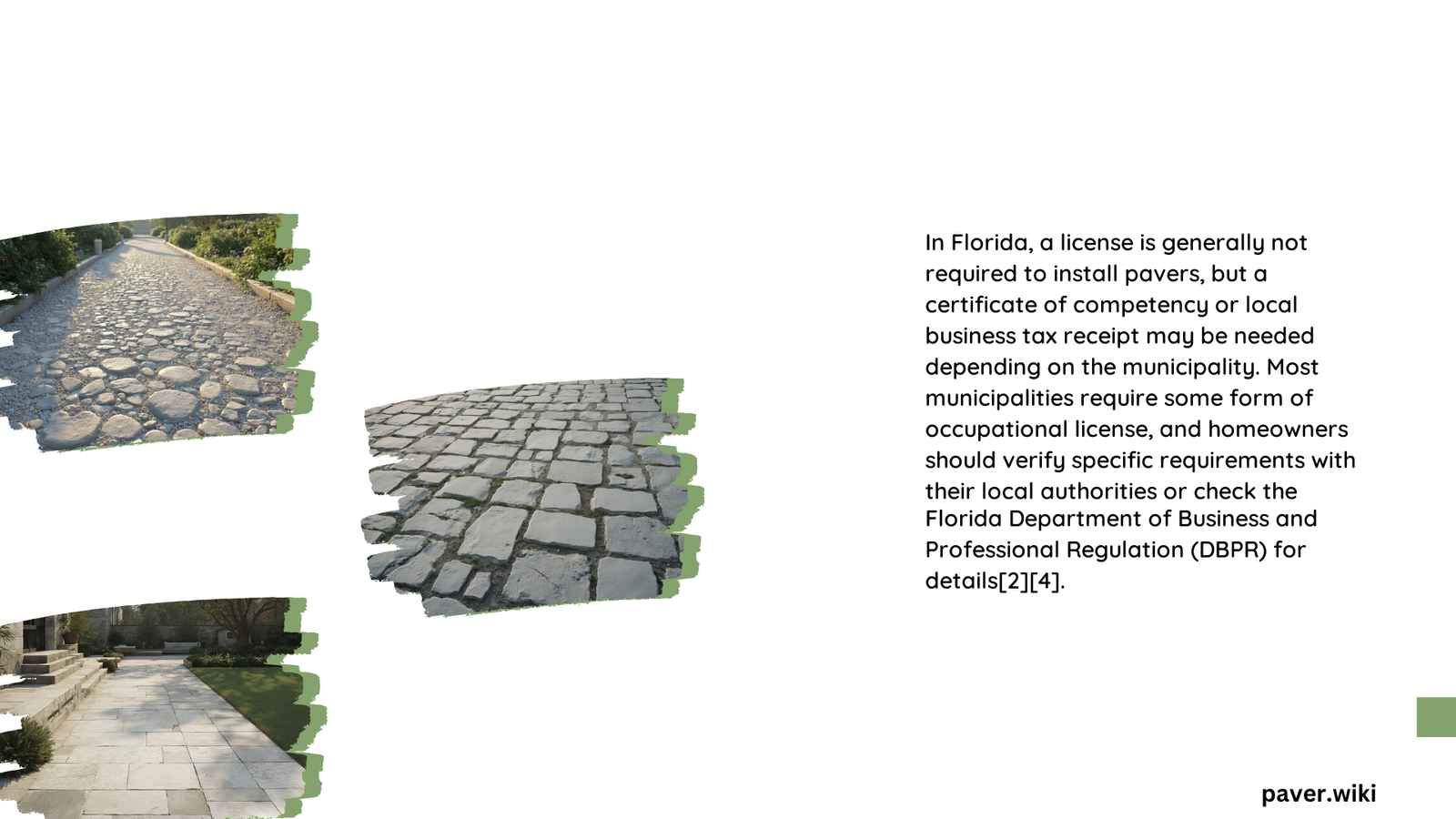In Florida, the requirement for a license to install pavers varies by location. While a state-level license is not mandatory, many counties and municipalities require local licenses or certificates of competency. This article explores the nuances of paver installation licensing in Florida, including local requirements, the application process, and specific regulations that paver contractors must follow.
What Are the License Requirements for Paver Installation in Florida?
The licensing requirements for paver installation in Florida are primarily governed at the local level:
- State License: No state-level license is required specifically for paver installation.
- Certificate of Competency: Many counties require a certificate of competency for paver contractors.
- Local Business License: A local business tax receipt or occupational license may be necessary.
- County-Specific Requirements: Each county may have its own set of licensing rules and regulations.
How Do You Obtain a Paver Installation License in Florida?

The process to obtain a paver installation license or certificate of competency in Florida typically involves:
- Competency Examination: Pass a county-specific exam testing knowledge of paver installation.
- Application Submission: Complete and submit the required application forms.
- Documentation: Provide necessary documents, such as proof of insurance and business information.
- Fee Payment: Pay the required licensing fees, which vary by county.
- Approval Process: Wait for the county to review and approve the application.
What Does the Competency Examination Cover?
The competency examination for paver installation usually includes:
- Plan reading and interpretation
- Material selection and estimation
- Site preparation techniques
- Soil characteristics and compaction methods
- Base and subbase installation
- Paver laying techniques
- Safety regulations and best practices
Are There Different License Types for Residential and Commercial Paver Installation?
In most Florida counties, the same certificate of competency or local license applies to both residential and commercial paver installations. However, it’s important to note:
- Some municipalities may have separate requirements for large-scale commercial projects.
- Additional permits or approvals may be necessary for commercial installations.
- Contractors should verify specific requirements with the local licensing board for each project.
What Specific Regulations Must Paver Contractors Follow in Florida?
Paver contractors in Florida must adhere to various regulations:
- Florida Building Code: Comply with relevant sections of the state building code.
- Local Zoning Laws: Follow county-specific zoning regulations for paver installations.
- Drainage Requirements: Ensure proper water drainage in paver installations.
- Material Standards: Use materials that meet local and state specifications.
- Installation Methods: Follow industry-standard installation practices.
What Are the Challenges in Obtaining a Paver Installation License in Florida?
Several challenges may arise when seeking a paver installation license:
- Varying Local Requirements: Navigating different rules across counties can be complex.
- Exam Preparation: The competency exam requires extensive knowledge and preparation.
- Documentation Complexity: Gathering and submitting all required documents can be time-consuming.
- Approval Timelines: The licensing process may take several weeks, depending on the county.
- Continuing Education: Some counties require ongoing education to maintain the license.
What Are the Consequences of Installing Pavers Without a License in Florida?
Installing pavers without the required local license or certificate of competency can lead to:
- Fines and penalties imposed by the county or municipality
- Legal action from clients for operating without proper credentials
- Difficulty obtaining permits for future projects
- Potential suspension of business operations
How Often Must a Paver Installation License Be Renewed in Florida?
License renewal requirements vary by county, but generally:
- Renewals are typically required annually or biennially
- Contractors must pay a renewal fee
- Some counties require proof of continuing education credits
- Updated insurance information may need to be provided
What Insurance Requirements Exist for Licensed Paver Installers in Florida?
While specific insurance requirements can vary, paver installers in Florida typically need:
- General Liability Insurance: Covers property damage and bodily injury.
- Workers’ Compensation Insurance: Required if the business has employees.
- Vehicle Insurance: For company vehicles used in the business.
- Professional Liability Insurance: Sometimes required for larger projects.
How Does Florida’s Climate Affect Paver Installation Regulations?
Florida’s unique climate influences paver installation regulations:
- Drainage: Strict requirements for proper water drainage due to heavy rainfall.
- Material Selection: Regulations may specify materials resistant to heat and humidity.
- Installation Methods: Guidelines for preventing shifting or settling in sandy soils.
- Maintenance: Requirements for sealing and maintaining pavers to prevent weather damage.
By understanding these aspects of paver installation licensing in Florida, contractors can ensure compliance with local regulations and provide high-quality services to their clients. Always consult with local licensing boards for the most up-to-date and specific requirements in your area.
References:
1. Volusia County Paver Contractor License Information
2. Levelset: What License Do I Need to Install Pavers in Florida?
3. Orange County Government: Residential Pavers
